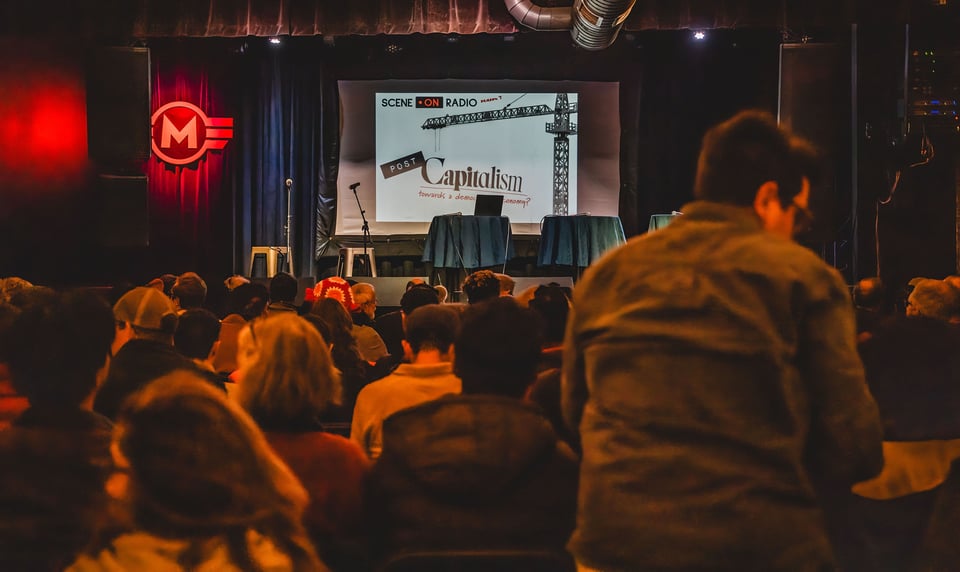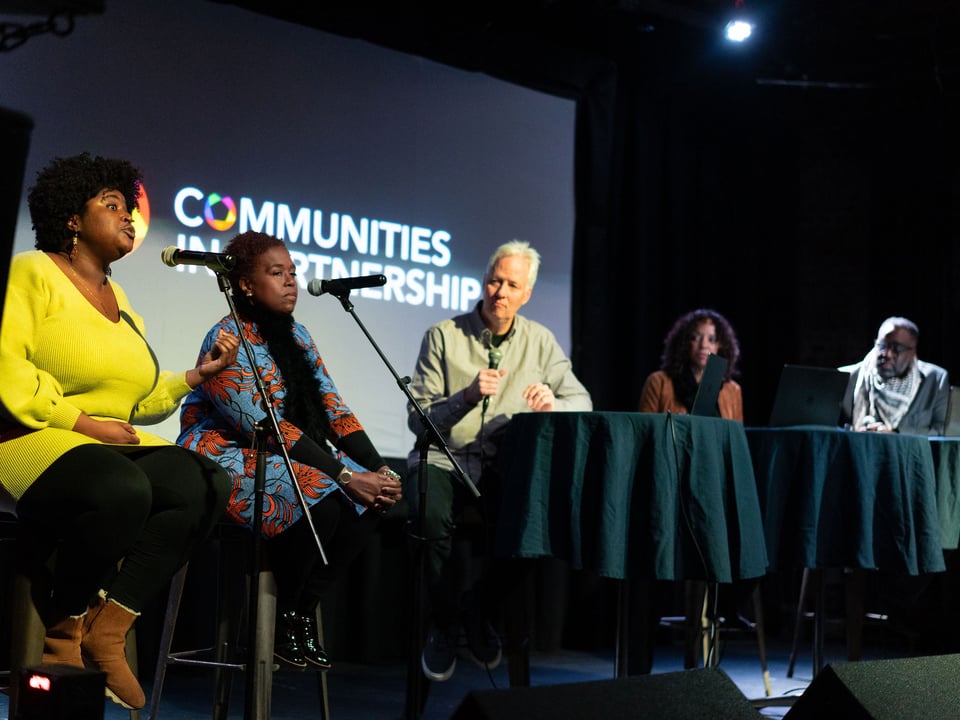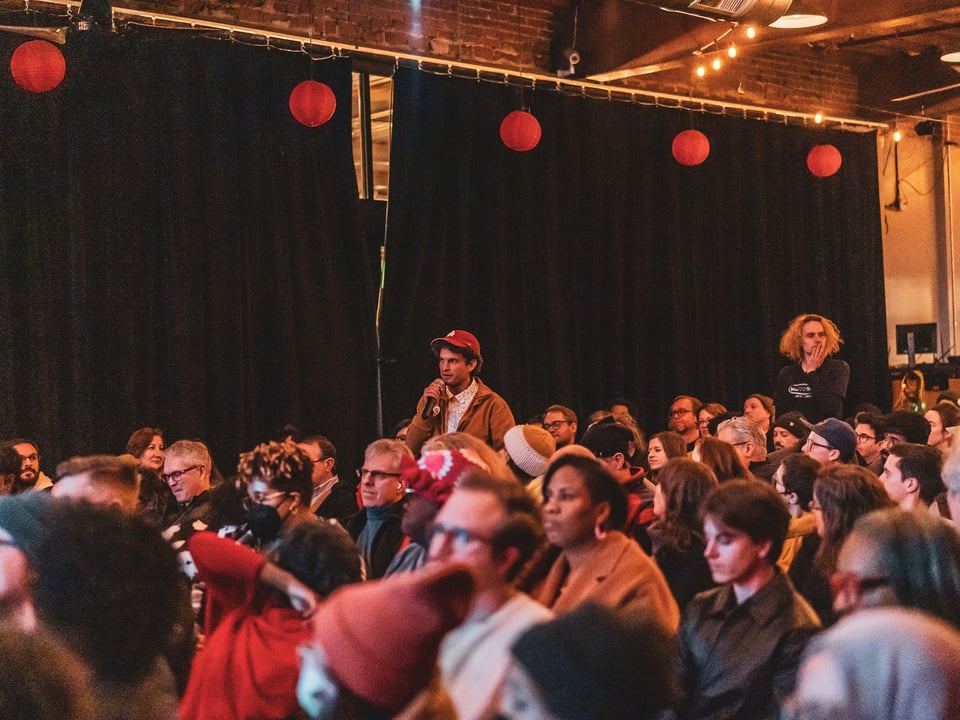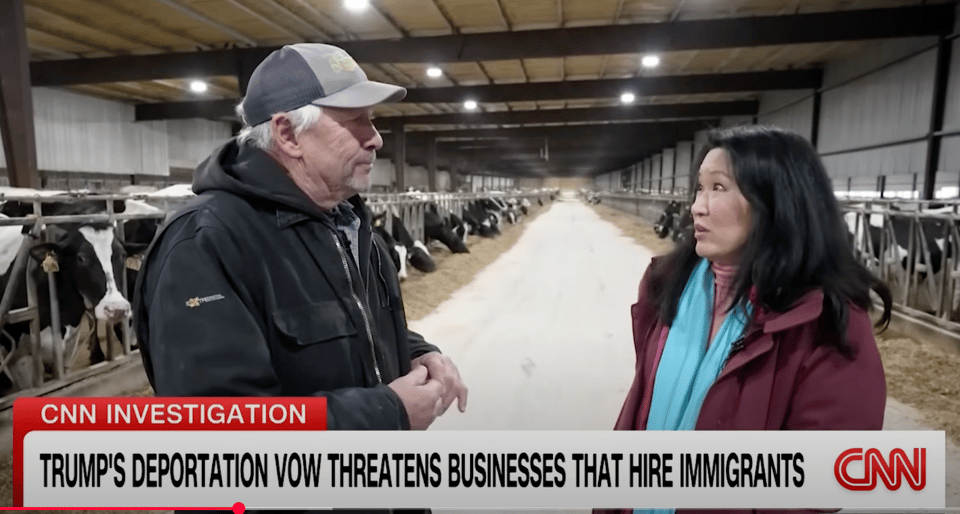Dark Days and Groundswells: Keeping ScOR #1
January 3, 2025

It wasn’t the turnout that was surprising, exactly. The December evening was chilly and dark, but Scene on Radio has a respectable listenership and many of y’all are quite passionate, so I was pleased but not shocked that 150 or so people would come out for our live show at Motorco Music Hall in Durham, North Carolina. After all, Ellen McGirt, my co-host from Season 7 (Capitalism), and Chenjerai Kumanyika, of Seasons 2 and 4 (our whiteness and democracy seasons) were on the bill, along with Camryn Smith and Courtney Smith of Durham’s remarkable community development organization, Communities in Partnership.

It shouldn’t have come as a surprise, either, that when we opened the floor for “live vox pop” – inviting audience members to take the mic and tell us something they would change about America’s economic reality – the answers came in bunches and ranged from powerfully progressive to radical.
“Universal healthcare and a universal basic income.”
“Free child care and maternity leave.”
A return to a 1950s-era 90% marginal tax rate on the highest incomes. “Move that right back up to where it was before.”
“Get money out of politics.”
“Limit CEO pay.”
Rewrite the U.S. Constitution to “put the planet first and human well-being second.”
“Dismantle the military-industrial complex.”
“Make it so all the working people of the world could decide what we do with the wealth that we generate.”
In the q & a period at the end of the evening, the word revolution was uttered several times.
Notice anything? None of the above was on offer by either of the two major parties in 2024 — including the party that the other one routinely derides as the “radical left.”
Of course, this was not a representative sample of the U.S. public or even of this strongly blue, left-of-center town. Most in this crowd were ScOR listeners, and we had recently completed a season-long series pointing out the failings of capitalism-as-we-know-it, questioning its core structures, and exploring reforms and alternatives. Folks were primed to chime in.

Still. There was something about this roomful of people, in a small city in the American provinces, and their plain-spoken intensity. Marjorie Kelly, author of Wealth Supremacy and The Making of a Democratic Economy, has written that those working for alternative economies constitute “a movement that doesn’t know it’s a movement.” Anna Muoio, an economic reformer who leads the New Capitalism Project, wrote recently on LinkedIn: “You know when you feel a groundswell? Feel it like a vast extensive swell moving through an equally vast ocean. It may not be a huge wave sighted from land. It may not even be seen or felt by many. But it's there. Undeniably so.”
Forget that the U.S. is the world’s richest country, as we so often hear and repeat. That claim refers to wealth in the aggregate, and a shocking share of this nation’s wealth is held by a tiny fraction of us. The three richest Americans hold more wealth than the bottom 50% of the population — 170 million people — according to the Institute for Policy Studies. Each year now, the highest paid 1% takes home more than the bottom 90%. In a “rich” country where three-quarters of us don’t feel financially secure, a groundswell for transformative economic change feels long overdue.
But the ground under our feet is rumbling for other reasons, isn’t it.
Those of us at Motorco came together in the fresh hell of the November election. American voters chose to re-elect Donald J. Trump — a racist, misogynist, would-be authoritarian demagogue who will do his best to advance the plutocracy, not fight it. He’s pledged to stop progress on the climate crisis, which he calls a scam and a hoax, and more than a few experts think his second term could well bring the end of the American republic.
When I and my co-hosts from past seasons (Ellen, Chenjerai, Amy Westervelt, and Celeste Headlee) convened virtually in November to discuss the meaning of the election, one theme was, well, “this is who we are.” Which eerily echoes the starting point for the series of series that Scene on Radio has put out during the Trump era. In Episode 1 of Seeing White (February 2017), I played a clip of the comedian D.L. Hughley asserting on “The View” that “Obama is what we would like to be. Donald Trump and his supporters are what we are.”
Is it that simple? Trump won again because he and MAGA represent the “true,” white supremacist-patriarchal-imperialist-oligarchic soul of America? As I tried to say in that post-election conversation, I believe that’s about half right. It’s part of the explanation but not all of it.
No doubt, a huge number of Trump’s supporters voted with eyes wide open for at least parts of his toxic agenda. But others, it seems, had nebulous reasons for voting as they did and often had little information (or disinformation) to go on. Kamala Harris won a solid majority of voters who say they follow politics closely. But among the quarter of voters who admit to paying little attention, Trump won big.
Some voted for Trump because they saw him as the change agent — the one who, if nothing else, would take a wrecking ball to systems they view as rigged. They may have believed he would — somehow, because he promised this, without laying out a coherent plan to do it — restore the America where people like them enjoyed upward mobility and a sense of control. Back when America was great. Harris rightly promised to protect American democracy (such as it is), but allowed herself to be positioned as the defender of the establishment and the status quo more generally. Not a winning posture in 2024.
What the hell did people vote for? What do they want — including the many millions who didn’t vote at all?
In a Washington Post survey in December, a majority of Americans said they oppose antidemocratic actions that Trump has threatened: using the military for a mass deportation of undocumented immigrants; pushing the Justice Department to prosecute his political rivals; jailing journalists for reporting that he doesn’t like; and having police use force against anti-Trump protesters.
Disturbingly large shares of respondents did express support for these moves, including majorities of Republicans. (Let that sink in.) Alarming numbers of Americans seem happy to welcome fascist authoritarianism, just as some refused to vote for a woman for president or supported Trump because of the way he brandishes white identity politics.
And yet I’m not convinced that any of these are majority opinions in the United States. I doubt that Trump could become president in a more functional democracy, one with an informed electorate — and at least one political party built unequivocally to serve regular people instead of corporate and monied interests.
What to make of these multiple, seemingly contradictory groundswells? And are they entirely contradictory?
There are others, of course. The groundswell of climate chaos, which our “leaders” are still failing abjectly to address. The AI groundswell — another surging force that we the people never chose but that promises or threatens to change everything. Here it comes, ready or not. Some folks are upset about violent crime, which they believe is soaring because powerful people on their screens said as much though crime is actually down. A recent surge in immigration (which has now slowed) created challenges in some places while also bringing the workers who’ve kept various industries afloat. The incoming president and his allies are shouting that immigration is an existential threat that’s “poisoning the blood” of the nation.
In the face of it all, maybe people are just kinda losing their minds.

In South Dakota the other week, a large-scale dairy farmer who voted for Trump told CNN that he doesn’t believe the new administration will actually deport millions of undocumented people – which would include vast numbers of workers that U.S. agriculture, and this farmer himself, rely on. (He estimates half of his employees are undocumented.) Such a roundup would mean, said the farmer, that “nobody will be filling the shelves. Nobody will be producing food. Within two days we will not have food.”
So the farmer voted for Trump while opposing one of his central campaign promises and (but?) believing that promise was a lie. Why does this South Dakotan have confidence that Trump won’t follow through? “We have to trust in our officials that are put in place,” the farmer said, headspinningly.
What did this man vote for? Or against? What do Americans know, or think they know, and how did they learn these “truths” about what’s happening in the world? Maybe more importantly, what are the feelings, the longings, and the fears driving people’s votes and other actions, and how are they shaped? What do Americans really want — and I’m thinking not just of Trump voters I might talk to in a diner but all of us, very much including the millions represented by that small crowd at Motorco Music Hall. Are we Americans a “we” in any meaningful sense? And, by the way, what does it mean that the rise of conservative populism is also happening across much of Europe, too?
These questions haunt me as I turn to the next season or two of Scene on Radio.
(Season 8 is a long way off. Not ready to make any announcements about it yet!)
Happy New Year, people.
Thanks to everyone who’s subscribed to Keeping ScOR so far. If you haven’t, you can do so here. Please spread the word or just forward this to a friend or three.
-
Another health care issue I have seen is how people on Medicare with mental health issues are frequently seen by a doctor for perhaps 10 minutes, frequently virtually, and meds are prescribed .There is no therapy included and no plan for improvement. It’s just drugs and move on. How can we help people live their best lives without providing appropriate care??
Add a comment: